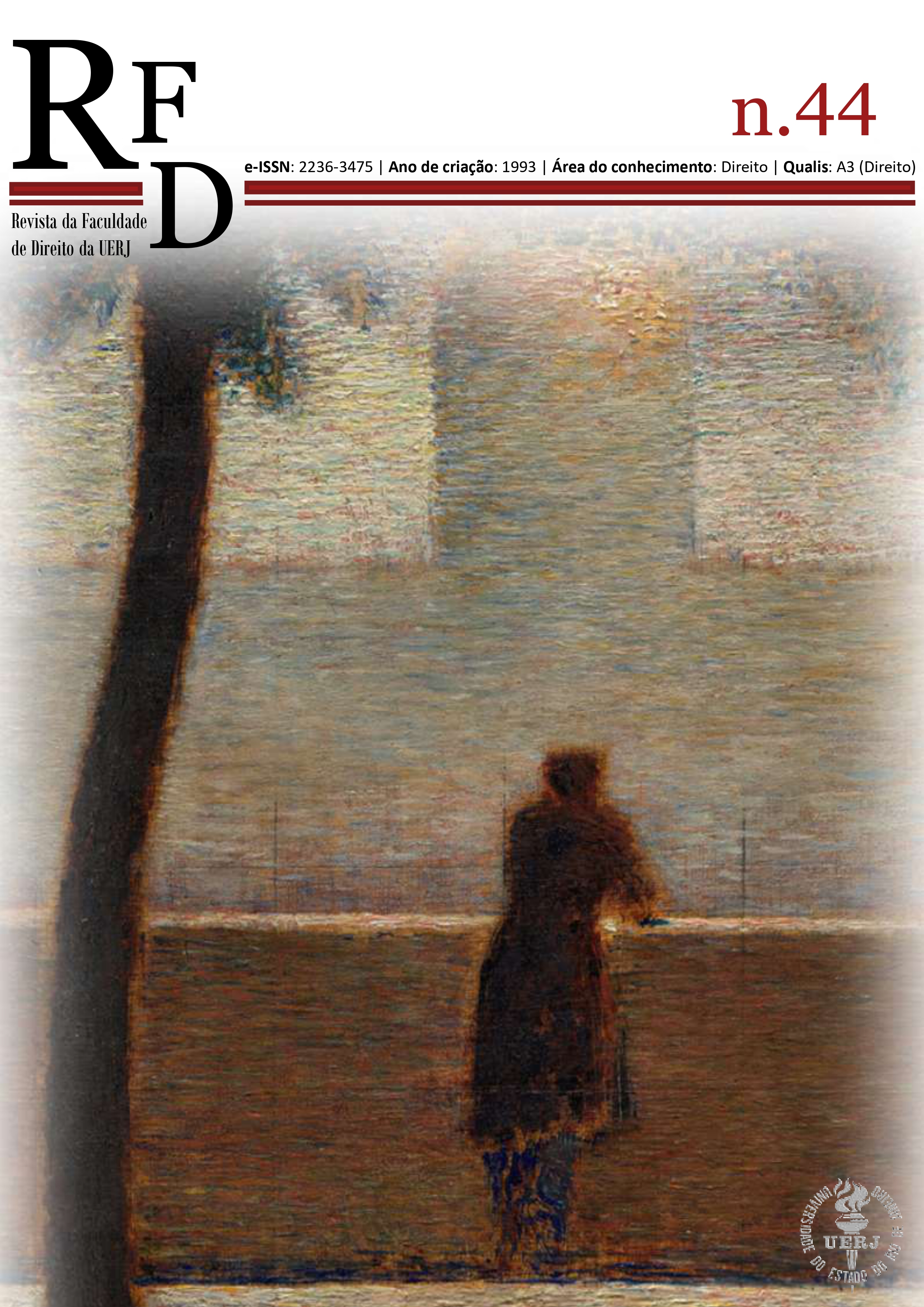Riscos do uso de algoritmos de Inteligência Artificial no processo de tomada de decisão judicial
DOI:
https://doi.org/10.12957/rfd.2025.91016Palavras-chave:
Decisão judicial, inteligência artificial, direitos fundamentais, riscos algorítmicosResumo
Este artigo tem por objetivo identificar e discutir os riscos do uso de algoritmos de Inteligência Artificial no processo de tomada de decisão judicial no âmbito do Poder Judiciário brasileiro, no contexto da Sociedade da Informação e da Revolução Industrial 4.0. A metodologia envolve pesquisa bibliográfica e documental. Os resultados da pesquisa indicam a distinção entre decisões humanas amparadas por algoritmos e decisões automatizadas que substituem as decisões humanas, e apontam para seus riscos jurídicos: a possibilidade de delegação da atividade decisória para não humanos, a estagnação da jurisprudência, o efeito ancoragem e a dificuldade de explicação das razões decisória. Destaca, por fim, a necessidade de respeito aos Direitos Fundamentais na utilização de algoritmos decisórios no processo judicial, seja para embasar ou tomar decisões.
Referências
BONAT, Débora; PEIXOTO, Fabiano Hartmann. Racionalidade no Direito: Inteligência Artificial e precedentes. Curitiba: Alteridade, 2020.
BRASIL. Constituição da República Federativa do Brasil de 1988. Brasília, DF: Presidente da República, [2016]. Disponível em: http://www.planalto.gov.br/ccivil_03/constituicao/constituicao.htm. Acesso em: 11 abr. 2023.
BRASIL. Lei n. 13.105, de março de 2015. Código de Processo Civil. Brasília, DF: Presidenta da República, 2015. Disponível em: http://www2.senado.leg.br/bdsf/handle/id/507525. Acesso em: 11 abr. 2023.
CASTELLS, Manuel. A galáxia da Internet: reflexões sobre a internet, os negócios e a sociedade. Rio de Janeiro: Jorge Zahar, 2003.
COMISSÃO EUROPEIA PARA EFICÁCIA DA JUSTIÇA – CEPEJ. Carta ética europeia sobre o uso da Inteligência Artificial nos sistemas judiciais e seus ambientes. Estrasburgo: Council of Europe, 2018. Disponível em: https://rm.coe.int/carta-etica-traduzida-para-portugues-revista/168093b7e0. Acesso em: 11 abr. 2023.
CONSELHO NACIONAL DE JUSTIÇA – CNJ. Resolução n. 332 de 21 de agosto de 2020. Dispõe sobre a ética, a transparência e a governança na produção e no uso de Inteligência Artificial no Poder Judiciário. Diário da Justiça Eletrônico (DJe), Brasília, n. 274, p. 4-8, 25 ago. 2020. Disponível em: https://atos.cnj.jus.br/atos/detalhar/3429. Acesso em: 11 abr. 2023.
ENGELMANN, Wilson; FRÖHLJICH, Afonso. Inteligência Artificial aplicada à decisão judicial: o papel dos algoritmos no processo de tomada de decisão. Revista Jurídica (FURB), Blumenau, v. 24, n. 54, p. 01-27, maio/ago. 2020.
FERRARI, Isabela (Coord.). Justiça Digital. São Paulo: Thomson Reuters Brasil, 2021.
FERRARI, Isabela; BECKER, Daniel. Direito à explicação e decisões automatizadas: reflexões sobre o princípio do contraditório. In: NUNES, Dierle; LUCON, Paulo Henrique dos Santos;
WOLKART, Erik Navarro (Orgs.). Inteligência Artificial e Direito Processual: os impactos da virada tecnológica no direito processual. Salvador: Jus Podivm, 2020.
GUEDES, Jefferson Cárus et al. Inteligência Artificial aplicada ao processo de tomada de decisões. Belo Horizonte: D’Plácido, 2020.
GUERREIRO, Mário Augusto Figueiredo de Lacerda. Inovações na adoção de Inteligência Artificial pelo Poder Judiciário brasileiro. In: BARBOSA, Mafalda Miranda et al. Direito Digital e Inteligência Artificial: diálogos entre Brasil e Europa. Indaiatuba: Editora Foco, 2021. p. 509-520.
HOFFMANN, Fernando; VIERO MACHADO, Isadora. Inteligência Artificial e a automatização da decisão jurídica: entre eficiência e efetividade processo-decisória. Revista da Faculdade de Direito da UERJ – RFD, Rio de Janeiro, n. 43, 2024. DOI: 10.12957/rfd.2024.72632. Disponível em: https://www.e-publicacoes.uerj.br/rfduerj/article/view/72632. Acesso em: 1 jun. 2025.
HOFFMANN-RIEM, Wolfgang. Big data e inteligência artificial: desafios para o direito. Revista Estudos Institucionais, v. 6, n. 2, p. 431-506, maio/ago. 2020.
MAGRINI, Eduardo. Entre dados e robôs: ética e privacidade na era da hiperconectividade. Porto Alegre: Arquipélago Editorial, 2019.
MCCARTHY, John et al. A proposal for the Dartmouth summer research project on artificial intelligence, august 31, 1955. AI Magazine, v. 27, n. 4, p. 12, 2006.
PINTO, Daniel Becker; LAUX, Francisco de Mesquita; ROJTENBERG, Natasha Amaral. Inteligência Artificial na gestão de recursos dos tribunais superiores: à luz do sistema VITOR. In: FERRARI, Isabela (Coord.). Justiça Digital. São Paulo: Thomson Reuters Brasil, 2021.
PIRES, Fernanda Ivo. Poder Judiciário, Inteligência Artificial e efeitos vinculantes. In: BARBOSA, Mafalda Miranda et al. Direito Digital e Inteligência Artificial: diálogos entre Brasil e Europa. Indaiatuba: Editora Foco, 2021. p. 495-508.
ROQUE, André Vasconcelos; SANTOS, Lucas Braz Rodrigues. Inteligência Artificial na tomada de decisões judiciais: três premissas básicas. Revista Eletrônica de Direito Processual – REDP, Rio de Janeiro, ano 15, v. 22, n. 1, jan./abr. 2021.
ROSSETTI, Regina; ANGELUCI, Alan. Ética algorítmica: questões e desafios éticos do avanço tecnológico da sociedade da informação. Galáxia, São Paulo: PUC-SP – EDUC, n. 46, p. 123-137, jan./abr. 2021.
TADDEO, Mariarosaria; FLORIDI, Luciano. How AI can be a force for good. Science, v. 361, n. 6404, p. 751-752, 2018.
SCHWAB, Klaus. A quarta revolução industrial. São Paulo: Edipro, 2016.
ZULLO, Bruno; TORRES, Maurilio; ARAÚJO, Valter Shuenquener. Big data, algoritmos e Inteligência Artificial na Administração Pública: reflexões para a sua utilização em um ambiente democrático. In: BARBOSA, Mafalda Miranda et al. Direito Digital e Inteligência Artificial: diálogos entre Brasil e Europa. Indaiatuba: Editora Foco, 2021. p. 477-493.
Downloads
Publicado
Como Citar
Edição
Seção
Licença
Direitos Autorais
oArtigos publicados na Revista da Faculdade de Direito da UERJ (RFD/UERJ)
Os Direitos autorais dos artigos publicados pertencem à Revista da Faculdade de Direito da UERJ (RFD/UERJ). É permitida a reprodução total ou parcial dos artigos desde que citada a fonte.
oReprodução parcial de outras publicações
Artigos submetidos que contiverem partes de texto extraídas de outras publicações deverão obedecer aos limites especificados para garantir originalidade do trabalho submetido. Plágio em todas as suas formas constitui comportamento antiético e é inaceitável.
Recomenda-se evitar a reprodução de tabelas e ilustrações, extraídas de outras publicações. O artigo que contiver reprodução de uma ou mais tabelas e/ou ilustrações de outras publicações só será encaminhado para análise se vier acompanhado de permissão escrita do detentor do direito autoral do trabalho original para a reprodução especificada na Revista da Faculdade de Direito da UERJ (RFD/UERJ). A permissão deve ser endereçada ao autor do trabalho submetido. Em nenhuma circunstância a Revista da Faculdade de Direito da UERJ (RFD/UERJ) e os autores dos trabalhos publicados nesta revista repassarão direitos assim obtidos.
·Os trabalhos não aceitos para a publicação serão devolvidos aos autores, se solicitado.
A Revista da Faculdade de Direito está licenciada com uma Licença Creative Commons Atribuição 4.0 Internacional.
Este trabalho está licenciado sob uma Licença Creative Commons 4.0, Atribuição-Sem Derivações.
Esta licença permite copiar e redistribuir o material em qualquer suporte ou format para qualquer fim, mesmo que comercial, desde de que citada a autoria original.











